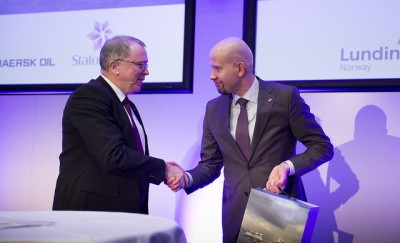Statoil’s new CEO, Eldar Sætre, reported some heavy losses last week, but they helped put his mark on the company while he keeps an eye out for potential acquisitions. The oil industry seems to be heading into takeover mode, and Statoil’s new boss from the mountains of Western Norway doesn’t want to miss out on new opportunities.

“Statoil will look for good opportunities all the time, to develop the company” Sætre told newspaper Dagens Næringsliv (DN) over the weekend. “Downturns can often present such opportunities.”
His comments come just days after Statoil reported some of its worst results in years. Low oil and gas prices and high costs are a poor combination for Statoil, and the company also took major write-downs on the value of much of its North American investments made in recent years. They’re simply not profitable after oil prices have been cut in half since last summer.
Many small oil companies, meanwhile, are struggling and analysts have been predicting more takeovers and “restructuring” of the oil and gas business. Shell is in the process of of taking over BG Group, and other major deals are churning through the rumour mill.
Sætre doesn’t seem to be scared off by Statoil’s own losses. Asked whether the company might even make new acquisitions in North America, Sætre said “yes … but I won’t speculate beyond that. It’s a completely natural thing we do as a company, to evaluate opportunities when they present themselves.” He noted that “when things are cheap, there can be better opportunities than when things are expensive.”
Knows the company well
Sætre, age 59, took over the top job at Statoil after working in the state-controlled company for 35 years. His first quarterly earnings report at chief executive was dismal but it also allowed him to clean up after decisions made by his predecessor and try to start fresh. Sætre knows the company well, after rising to become Statoil’s finance director and then leading its marketing, processing and renewable energy divisions. He’s been part of Statoil’s top management for 12 years and told DN in a portrait interview earlier this spring that he thinks it’s interesting, even fun, to deal with accounts. A former top Statoil executive said Sætre has “a well-balanced ego and good judgment.”

Sætre, who hails from the spectacularly scenic mountains and fjords of Western Norway, also seems keen to give Statoil as green an image as an oil company can have. At a major oil and gas industry conference in Houston last month, Sætre said he thinks low prices and difficult conditions in the Arctic may mean that oil and gas discoveries are left to lie under the seabed of the Barents. Statoil is one of the world’s biggest operators in the Arctic, not without controversy both at home and abroad, but Sætre was candid in claiming that climate change has been caused by human activity, that a price needs to be placed on carbon emissions and that the oil industry must contribute towards finding solutions if it’s to retain any legitimacy.
His comments caused a bit of a stir, even though Statoil bosses have mentioned this before, but climate and environmental activists back home in Norway weren’t impressed.
“I think the reaction says more about the audience he had than anything else,” Ander Bjartnes, who leads the organization Energi og Klima, told DN. “Statoil wants to be a ‘climate-correct’ oil company, but within its business model. There is no sign of any change in strategy.”
Truls Gulowsen of Greenpeace Norway agreed. “Statoil is an expert in camouflaging ‘business as usual’ as climate policy,” Gulowsen told DN. “If Statoil was serious, they can’t have a strategy that includes going after the most carbon-intensive resources like tar sands and deep-water drilling in the Arctic.”
Still different from other oil executives
Sætre is very much business-oriented but his nature and lifestyle do set him apart from many other oil industry executives. He was the youngest of six children raised in a rural environment, marched in the local brass band, played football and “still climbs the same mountains” of Sunnmøre, “just slower” than before. He’s married, has three children and claims he hasn’t undergone a major change in status since becoming chief of his homeland’s biggest company.
“I’m still the same person, and I notice that when I come home home to Vartdal,” he told DN. “I hang out with the same people I always have, I’m down-to-earth and like simple things. I’ve never sought anything else. I like raspeballer (potato dumplings, sometime filled with salt pork) better than the finest French dishes.” His father was a carpenter and had his own building firm, where Sætre sometimes worked during summer holidays. That’s where he got his first taste of accounting.
In his 35 years at Statoil, he’s been involved in some of its biggest moments, not least when the company was stocklisted and the state’s stake was cut to what’s now 67 percent. Sætre also played a key role in Statoil’s acquisition of Norsk Hydro’s oil and gas operations in 2007 and now he’s eyeing more takeover candidates. He insists that the results he presented last week “were the most healthy and sensible evaluations” he could make “in this situation.”
newsinenglish.no/Nina Berglund

